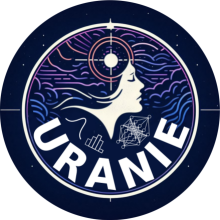Documentation
/ User's manual in C++
: 
Table of Contents
In the Optimisation module of Uranie, the word optimisation has two meanings:
The search for the optimum set of values of a function that takes its values in
 . This optimisation
research regroups two realities:
. This optimisation
research regroups two realities:
the search for the set of inputs that produce the optimum of a function (analytic function or a computational code);
the search for the optimal set of parameters of a model which minimises the difference between reference values and estimations from the model got from computational code. This difference may be the root mean squared error or a weighted root mean squared error.
The search for a set of inputs that minimise a cost function that takes its values in
 (
( ), i.e. multi-objective optimisation,
what represents the search of the Pareto frontier in the costs space.
), i.e. multi-objective optimisation,
what represents the search of the Pareto frontier in the costs space.
Tip
In order to avoid confusion, please note that the word function will be used to name either a C++ function or an external code.
In this section, when dealing about an optimisation, we will always refer to minimisation, keeping in mind that the maximisation of a function is equivalent to the minimisation of its opposite. A discussion on the general concept of optimisation (with the difference between global and local and an simple introduction to the Pareto frontier, can be found in [metho]). The multi-criteria discussion has been moved to the Reoptimizer part (in Chapter IX). The use several multi-criteria algorithms, gathered in the Vizir package, is now only supported with the implementation done in the Reoptimizer package.





